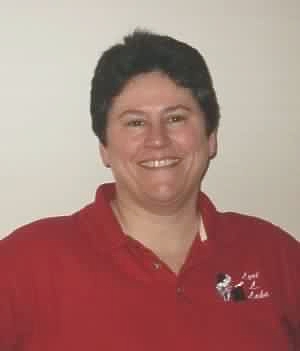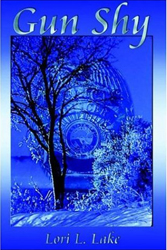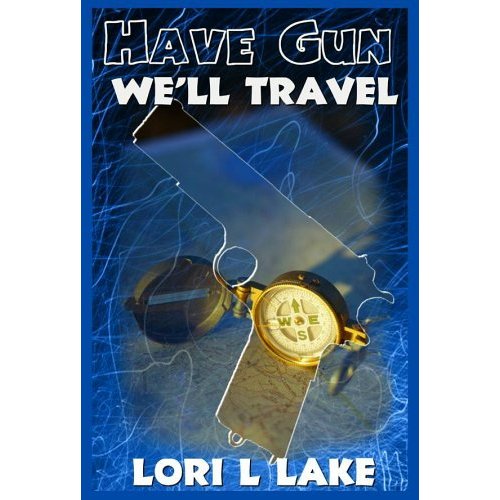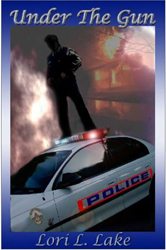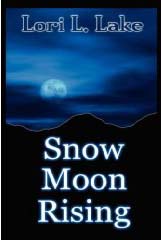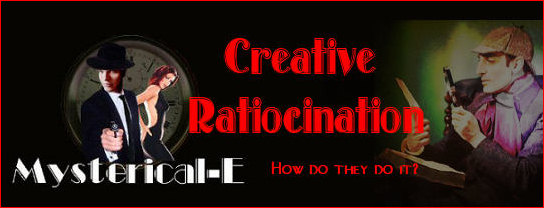 |
An Interview With: by JRG De Marco
1 – You've said: “I work on whatever novel "calls" to me at the time. Right now I am having good luck with scenes for UNDER THE GUN. When that quits on me, I'll move to one of the other ones and work on it until I can get back to UNDER THE GUN again. I never have writer's block that way.” Working on different manuscripts at once. Doesn't that get confusing? How do you get from one mode of thinking to another? How does this approach affect your work? Sometimes I think I have sequential writer's block. I'll get stuck on one novel, and I won't know where it's going next. I could sit back and wait for the answers to come to me – or I could work on another project. I usually choose the latter tactic. Then I'll get stuck on that project and go back to the first one or start so me thing else. I do wish I could just plow right through an entire first draft of a book, beginning to end, with no delays, but that rarely happens for me . Something always gets in the way, and I end up having to be patient. It isn't all that confusing because I'm not really working on more than one thing at once . . . so it's kind of sequential. The shift from one plot to another, from one the me and set of characters to another can be strange, but sometime s that's just the way it goes. If I were able to fully envision an entire novel, perhaps it would be easier. Since I can't outline and plan it all in advance, I have to muddle along through as best as I can, and eventually the approach seems to work.
2 – I understand that Xena and Gabrielle influenced your work (how and why). Do Xena and Gabrielle still echo in your characters or have you moved them in a different direction? The first novel I wrote, RICOCHET IN TIME , was soundly rejected by every gay/lesbian press on the planet, and I pretty much thought my opportunities for print publishing were non-existent. When I found the fan fiction community, it was a balm to my battered soul, and the encouragement I received upon posting the first parts of GUN SHY really made a huge difference. I wrote that novel after asking myself this question: If Xena & Gabrielle were alive in Twentieth Century America, who would they be? The obvious answer (to me, anyway) was that they'd be cops. I utilized the archetypes and wrote. Imagine my surprise when a publisher saw the online novel and offered me a contract! I've published three novels with those characters, and three without. Dez and Jaylynn took on personalities and lives all their own, though I would still say that they represent somewhat archetypal characters, just as Xena and Gabrielle do.
3 – Your characters, for example Jaylynn and Dez -- do you get attached? Or the minor characters or perhaps even the villain – is there a certain attachment? Do you hate killing them off or allowing bad things to happen to them? Writing about characters, thinking about them, dreaming of their situations – all of this makes them seem completely real, as if I could walk down the street and run into any number of my imaginary creations. I do feel attached to them, and it's terrible when bad things happen to rock their worlds. Still, conflict and problems are the heartbeat of a novel, so of course difficult situations and confrontations have to arise for protagonists. The villains and antagonists are also very interesting to me . I remember writing HAVE GUN WE'LL TRAVEL and becoming quite attached to Grigor, the Russian enforcer guy who is trying to track the escaped cons. Even though he was a “bad guy,” I found him endlessly fascinating. The other Russian, Vanya, who was willing to kill off anyone who got in his way was also absorbing, but he interested me more along the lines of a car crash you can see is going to happen, but can't prevent. 4 – Do you see yourself in each character? Or, how much of yourself goes into the characters? And in what way? I'm constantly balancing this aspect of writing. On the one hand, many characters I've written have been who I would be if I were faced with those circumstances and life experiences. With that kind of character, I suppose quite a bit of me gets co-opted into the character. On the other hand, some characters are Not Me, not at all. Even if I were faced with that character's conflicts, I wouldn't choose the route he or she has chosen. For instance, I'm working on a disaster novel right now, an ensemble type of book with four sets of characters who are all part of the braided plot. With a large cast of characters, the writer can't afford to invest a lot of herself into each character or they start to run together and not seem like the unique individuals they need to be. So while there is a key character who shares my ethical stance, and one with my sense of humor, there are several others who push that envelope in different directions. Many have had experiences I've never had and never will have, so between imagination and research, I have to create something very different from what I know in my own limited world. 5 – How much research do you do? One famous writer I know, who shall remain nameless, says that he doesn't do much research at all. That really the most important things “to get right” in a mystery/thriller/suspense novel are the guns and the cars. That's what he's gotten the most feedback on when he's gotten it wrong. How do you feel about that? Without insulting anyone (I hope), I have to admit that anyone who doesn't do the research needed to create an effective, believable world is missing the boat and will likely have problems keeping a publishing career afloat. In crime fiction, if you get the guns and cars wrong, people will notice, but it's not like guns and cars are all that matters. Think of all the forensic details, or the types of jobs sleuths and detectives might have themselves or have to navigate: police, PI work, insurance, hospitals, and much, much more. While many readers can be quite forgiving, if you make the same mistakes over and over, eventually the reader grows tired of what seems like stupidity on the writer's part, and you lose the reader. I do the research – perhaps not at the get-go, but certainly along the way and definitely before submitting a book. I enjoy learning new things and going through most of the research process. Usually what happens to me is that I dream up a character in a situation and that's my first inspiration. From there I begin writing scenes to see where it goes. The deeper I go into the story, the more pieces I find require research. And it's not always the big details that sink the writer's narrative – not the dates or famous people or scientific processes, I mean – but it's the smaller issues. When I wrote SNOW MOON RISING, not only did I have to know and understand details about World War II, but I needed to understand aspects of Gypsy/Roma culture, German attitudes, 1940s fashion, European weather, and so much more. It's one thing to write a novel based on your current time, culture, and region of the country; it's quite another thing to write about another historical period, some other culture, or somewhere you've never lived or haven't visited in a long while. The bottom line is that many writers who start a novel or story really don't know what they need to know until they get into the narrative. But if the writer fails to do the research to add authentic detail, the reader is unlikely to get a sense of verisimilitude, and the book suffers.
6 – You once said, “The knowledge that bad things happen to good people - and far too often - is something I have always known, both literally and figuratively. But the realization that painful, frightening, even terrifying events and losses have a ripple effect through one's whole life . . . well, I didn't truly know and understand that until I wrote Gun Shy .” I think when we're young, we tend to believe that if we do the right thing, try hard enough, and stay on the right side of the law, we'll be rewarded. I know I had a topsy-turvy childhood, but even as a teenager, I always believed that if I hung on long enough, ultimately I would prevail and be rewarded. As we get older, however, and see the randomness of the world, it becomes apparent that there's no balance sheet, no fairness factor. Some people wander through life with nary a scratch; others are beaten down at every turn. What happens to people during their lives has a way of following them, like the old cliché about everyone dragging around baggage from one relationship to another. Sometimes that suitcase is packed full of incredibly painful things: abuse, neglect, childhood deprivation, grief and loss, and more. In GUN SHY, Dez Reilly is packing around significant old pain, and it does, indeed, have a ripple effect on her life, so much so that I had to write UNDER THE GUN so that she could vanquish some of those old ghosts. She didn't deserve to have her work partner killed, and yet it happened, and she had to deal with it. Just like in real life, fictional stories are filled with people who have bad and unexpected things happen to them. How they deal with that is what makes fiction most interesting to read and to write. 7 – About book contracts, you said, “ My first book contract was a fiasco that I try to forget ever happened. From it, I learned how important it is to research a market, a publisher, and the details of a contract.” Don't sign on the bottom line until you know a lot about the business of publishing and have had knowledgeable people (i.e. other authors, an attorney, your agent) go over every aspect of the contract with you. Make sure you understand what every single term means and what expectations the publisher has of you. Don't hurry to sign with any press until you find out everything you can about their focus, practices, and reputation. Be fully informed now to avoid heartache and headaches later.
8 – How do you decide the “pace” of a story? Some are fast, some are slow – how do you decide that? What factors influence the pace? This is not an easy, quick answer, Joe. Do you want a mini-lecture on that? See, the type of story or novel you want to write and sell will determine some of the pace. Mysteries and thrillers tend to move along swiftly with action, investigation, high conflict, dialogue that clips along, and so forth. A literary novel, on the other hand, is often much slower. The language used may be “prettier,” and the storyline often rolls out more deliberately. A science fiction writer usually has to balance action and fast pace with a great deal of world building and description, which means that the pace of most speculative fiction has to be carefully considered. Pace is all about how a story moves, how it progresses. Pace ensures that there is a rhythm that makes sense and a hook that pulls the reader along from page to page so that he or she is constantly asking: “What's going to happen next?” “How the heck is this going to be resolved?” “Why in the world did she do THAT?” A story's pace can be quick. Jerky. Scattered and tense. Filled with action and conflict. Bombs explode. Guns go off. People run. Scream. Fight and struggle. Or the tale may be long and languid, filled with tangents and description and likely to skim along effortlessly as though the reader were floating on a comforting river. Your word choices and sentence structure will influence pacing just as the two previous sentences reveal. Short, choppy sentences tend to increase the pace. Longer, more complex sentences slow things down. Most books have some scenes that move with some level of speed, and other scenes that move more slowly, and the overall pace of the book is determined by how the author balances everything along that FAST /SLOW spectrum. The writer does have to make deliberate decisions. Which chapter leads off? Which scenes get full treatment and which get only partial treatment? How much of the story events get revealed in exposition? Or by dialogue? Or in flat, quick summary? The best types of novels tend to have a nice balance of action and snappy dialogue interwoven with narrative, descriptions, and segues. Narrative drive is another term I like to use that includes pacing, immediacy, and suspense, all of which combine to create an experience for the readers that makes them want to keep reading. You don't want to have a nonstop rollercoaster– remember that after about five minutes (or less) on a rollercoaster, everyone starts throwing up. On the other hand, long, draggy detail and description puts people to sleep. However, fast, action-packed scenes need to be interspersed with moments of calm. Give the visitors to your amusement park some time to rest a bit, have some cotton candy, walk to the next ride. Just a few of the tactics you can use to affect pace include: *Use action and dialogue to increase pace; descriptive exposition slows things down. In particular, pay attention to the rhythm and length of your sentences. Short and choppy speeds things up; longer and complex slows things down. *Tighten and shorten transitions between scenes when you want to pick up the pace. *Create deadlines or timelines to add a sense of urgency. The ticking timebomb. The secret to be divulged if X doesn't happen. The growth of the tumor if not surgically removed by a certain date. All of those kinds of factors add tension and can increase pace. *Be sure that you're telling the story from the most effective perspective and point of view. If things start dragging, perhaps a particular scene needs to be seen through someone else's eyes. *Resist the urge to over-tell or over-explain. Let the scene and the characters naturally come to realizations or discoveries. Anytime you tell what is happening, then show it in a scene, the reader will be dissatisfied. Just show it. And if you've shown it, there is no need to recap and tell the reader what just happened. The readers were “there.” They just read it. *You can count on cliffhangers to quicken pace. Don't be afraid to end a scene or chapter without wrapping it up. Leaving the reader hanging can be very effective as long as you don't overuse the tactic. But be sure to reliably resolve the questions left hanging, *Cut or trim unnecessary or lengthy scenes if they don't add to the rhythm of the piece.
9 – Do you believe it's important to leave readers with a sense of hope at the end of a work? Or, do you allow a story to go where it will regardless of the end, even if it can offer no hope? I'm essentially an optimistic person and a romantic at heart, so the stories I love best (both to read and write) are ones where the characters may go through hell, but in the end there is always hope. Lately, I've been reading a lot of post-apocalyptic fiction to see what's been done before. I just finished George R. Stewart's 1949 novel, EARTH ABIDES, which was excellent, and I was blown away by MK Wren's amazing 1990 book, A GIFT UPON THE SHORE. Both were excellent reads because they ultimately celebrate human spirit. Nevil Shute's ON THE BEACH, on the other hand, is a tragic piece about the end of the world where there is no real hope at all, so that one did not impress me .
10 – What balance among characters do you try to achieve? I don't know that I consciously try to achieve a balance among characters. I just try to make each main character as strong and suitably unique as the story calls for, and then I try not to fall too far into stereotype with secondary characters. The plot is going to call for certain kinds of characters, and those story people will tend to call for a particular type of plot, and somehow, that all seems to balance out.
11 – What do you feel are the most prevalent and important themes in your novels? Well, there's that issue of hope. I think my novels and short stories focus on the resilience of human spirit, the importance of community and friendship, and the idea that facing conflict, though scary and sometimes dangerous, is necessary. Bravery – true courage in the face of any kind of fear – rates high in my story worlds. I think love, respect, and generosity are important human qualities, and their opposites - indifference, hatred, selfishness – often come into conflict in my stories.
12 – What is your approach to writing a novel: that is, do you outline or not? Do you keep files and piles of notes? I'm not an outliner. The whole process of writing a story or novel is a voyage of discovery for me . Having learned the hard way that it's easy to forget details, I do keep a 3-ring notebook for each book with sections for character details, plot points, and other data, and I keep all my research notes and citations as well.
12.1 What are some of the tricks, pitfalls, etc. that you need to keep in mind when writing a mystery novel/story? A mystery is always more than what it appears on the surface. A good mystery is, essentially, a mining and excavation project for the sleuth. The reader wants to see new artifacts uncovered at a proper rate, so one of the first things the writer has to attend to is the periodic revelation of clues. Most mysteries are not a linear process of excavation, though. Each clue unearthed ought to lead to more than one possible conclusion. Important clues often seem inconsequential while items or facts that appear, on the surface, to be critical, often wind up leading the sleuth down the wrong path. Your detective needs to keep hopping, keep looking, keep reassessing and re-evaluating and re-orient as new information comes in or takes on new meanings.
13 – What is it that kick starts a project for you: a character, a situation, or…? It's usually a character in a situation. For instance, in my WWII survi val novel SNOW MOON RISING, I dreamed of Mischka Gallo, a Polish/Gypsy woman who was stuck in a labor camp. I had a specific image of her lying on the top rack of sleeping berths in a cruddy Nazi barracks. She was trapped and needed to escape. For the GUN books, my first image was of Dez Reilly – tall, dark-haired, and slightly dangerous – getting out of a cop car at night in front of a house where dispatch has sent her. I had this impression of such heaviness, such grief, and yet there she was, still doing the best she could to do her job.
14 – What started you in writing? (Was it always a dream of yours?) I've wanted to be a writer since I was in grade school and wrote my first story about a skin-diver who was suspiciously similar to the Lloyd Bridges character in “Sea Hunt.” I was always a storyteller, always interested in how to tell a narrative, and always a very big reader. I tackled adult books by age nine (Jack London, Alfred Payson Terhune, Louisa May Alcott, Erle Stanley Gardner's Perry Mason novels, HG Wells, etc.). I always liked adventure and mystery in novels, especially when the protagonist was challenged to rise above circumstances and conquer what seemed like insurmountable odds. 15 – What keeps you writing? What inspires you? The highest high I get is when I finish a complete first draft. Nearly as close to that high is that occasional state we writers get into where we're in “The Flow.” I love that state of mind where I cruise along, writing unexpected scenes, finding out new angles for the story, progressing forward in surprising directions. That inspires me greatly.
16 – Can you tell us a bit about the first novel you had published -- how did that come about? And how do you feel about it now, i.e. would you like to change it and how? GUN SHY was the first novel I had published, though it was the second I wrote. (RICOCHET IN TIME was first.) I'm still fond of it, though I see flaws. I could have been more concise. I could have done some better transitions here and there, but I'm fine with its imperfection as it stands. I got a chance to do a second edition and clean up some of the typos and awkward sentences, so I'm satisfied. It's actually kind of nice to see all the ways I've grown from my earlier works to these latest ones.
17 – How have you grown as a writer since that first novel? 1) What has gotten better? I think my writing skills and technique have improved. I'm also much better at seeing the scope of the story and at envisioning the various characters' arcs and journeys. • What things have you dropped along the way? Oh, I don't drop much. Sometime s I feel like a packrat, wandering around collecting up stuff and carting it into my very cluttered nest. • What helped most in your growth as a writer? Practice, practice, practice! Not counting articles and nonfiction work, if you count up all the words in my published novels and stories, I'm up over a million words. Multiply that by a factor of about three for all the drafts and then add all the stuff I haven't yet completed, and that's how many words of fiction I've written. The more you write and work at writing, the better you get at it.
18 – What are the three most important pieces of advice you'd give to writers? *Practice your writing, and show it to trustworthy people to get advice and feedback. *Read widely in the field you're writing in and in other areas. But don't merely read for fun – you also have to analyze the works in order to figure out what the other writer is doing and see if you want to try that (or avoid it). *Learn as much as you can about the craft of writing. Read books on the topic, take courses, try to me ntor and share with others. Writing is a solitary occupation, but it can also be shared in a community of writers.
19 – Who are the authors who you admire most, who inspire you, whose writing you think is most beautiful, moving, exciting? Because I like so many different kinds of writing, I'd probably have a list of ten to twenty authors in science fiction, mystery, fantasy, thrillers, adventures, memoir, not to mention several subsets of literary fiction. Right now I'm reading classic apocalyptic/post-apocalyptic novels, and I have to give high marks to Stephen King, SM Stirling, and Richard Matheson. I think my favorite mystery novelist is Marcia Muller. For excitement, I absolutely love Thomas Perry's Jane Whitefield series and Lee Child's Jack Reacher. I still think Anne Tyler and Margaret Atwood write beautifully. And perhaps my favorite writer of all time is Ray Bradbury.
20 – What do you find most satisfying in a book: a great plot, beautiful writing, fully realized characters? All of the above in appropriate combination. I do think, however, that a great plot and good characters can go a long way, even if the writing is only workmanlike.
21 – In your own work, what do you think you are strongest at: plot, beautiful prose, character? Or something else? I'd be interested to hear what others think about my work in light of this question. My instinct is to say I'm strongest as character, which then assists in making plot work. I don't think that I'm a stylist or that I write particularly “beautifully.” But I continue to work at technique with the goal of making my prose smooth and readable. It's a constant battle.
22 – How do you plot a mystery or a thriller – what stymies you most, what do you find easiest? What advice can you give on plotting a mystery? Mysteries and thrillers are different animals. I love the advice and information Carolyn Wheat gives in her How-To book, HOW TO WRITE KILLER FICTION: THE FUNHOUSE OF MYSTERY AND THE ROLLERCOASTER OF SUSPENSE. The title alone brings up two differences between those kinds of crime fiction. In a mystery, a lot of what readers get as they read is similar to funhouse mirrors. What you see on the surface ends up being distorted and not necessarily the real Truth. Looked at from various angles, the clues in a mystery morph and change just like your physique elongates or looks squatty and fat in the funhouse mirror. Thrillers, on the other hand, are more like a rollercoaster. You'll get some nonstop, breathless action, then a calmer section, then another fast turn with a lot of jouncing, and next thing you know you're climbing up a hill to God-knows-where, and not until you get to the top and peer over do you see the terrible drop and find your heart pounding out of your chest. Both mysteries and thrillers have a general form (not a formula, a form), so in my humble opinion, it's actually very hard in many ways to write a clever, innovative novel in those genres because tens of thousands of them have already been written. The challenge is not only in laying out the clues well and creating a sympathetic protagonist and a believable antagonist; it's also in using voice, style, character quirks, circumstances, and background, and interesting settings to roll out something new and different.
23 – Does the world you create in your non-series novels continue to live in your mind long after you've completed the novel? What implications does that have in terms of wanting to do a series in the same setting? a) Do you constantly think about that world and compare it to reality, changing it or fixing it as you go along? Once I've created a world and lived in it with my characters, walking in their shoes, hearing their thoughts, experiencing their joy and pain, I don't ever forget the feel of that world. Over time I may forget details – birthdates, details of various events, even names – but the feeling of the world is still with me. I can still imagine myself riding through the Arizona desert in the touring bus with the band in DIFFERENT DRESS. The barracks in SNOW MOON RISING is absolutely real to me . I think that any writer can do a series – or perhaps every book s/he ever writes – in one setting. Agatha Christie's Jane Marple stayed pretty close to the village of St. Mary Meade through a dozen novels and a multitude of short stories. Micky Knight, of JM Redmann's marvelous mystery series, does her detecting almost exclusively in various New Orleans haunts, and the base of operations for Jane Lawless of Ellen Hart 's series is Minneapolis . In some ways, it's easier to move thriller characters through a landscape of settings than to do the same with story people in a mystery. Many thrillers have far-flung plots of espionage, international drug trafficking, and the like which require the characters to travel. If the story world matches up with the real world, then adjusting it in fiction as it changes in real life is probably a good thing. In fact, changes can serve as interesting details or points of contention for the sleuth(s). In Nevada Barr's Anna Pigeon series, the state parks and national preserves Anna works in often take on a sort of personality and almost serve as characters in their own right. But some stories are based in settings that are not “real” such as Sue Grafton's Santa Theresa , California , where Kinsey Millhone operates. I would think all authors have to decide how much to compare, change, and fix their story worlds based upon the way they use them in the text.
24 – What are your goals as a writer? *Write interesting and entertaining novels and stories that people enjoy reading. *Continue to learn, not only about writing craft and technique, but also about the world and how the people in it survive, fail, thrive, succeed. *Build a career that allows me to make a living.
25 – Talk about your most recent book and what it means to you. 1) What sparked the idea? How long had you had this idea before starting to write? My most recent book is not yet published, but the characters for the novel have been percolating in my mind for about three years. It's a straight-up mystery, the first in a series, about an investigator looking into a suspicious death in a senior living community. I actually had written another book in this series, but came to discover that there was too much backstory and previous “stuff” going on that I kept alluding to. I realized that I had written the second book in the series, so I went back and wrote the first novel, and I'm glad I did. Now with all I've learned about the characters, I can go back and do revisions on the second book and make it much stronger. What sparked the idea was the vision of a strong woman cop who couldn't shoot straight. I won't go into a lot of details on that – suffice to say that my initial vision has carried me through the writing of two books, and I have five more in the character's arc that I believe I can write. • Did you feel compelled to write this book? About this subject? Yes, I did feel compelled. I read a lot of mysteries, and I very much enjoy novels where the protagonist is attempting to do his or her job while also juggling their own personal issues, internal worries, and relationships. That's definitely what happens in this book. • How did you approach the planning and writing? Did you prepare an outline? Would you share your outlining and preparation processes? I regret that I can't share an outlining process because I don't have one. (I *can* tell you how to outline after you've created the book <g>). I generally think a lot about characters and try to get a handle on their personalities, then place them in a situation where there are no easy answers. For Dez Reilly in GUN SHY, for instance, I saw her as a strong, efficient cop with confidence and real ability in the work world, but who hasn't had much success with love relationships due to issues arising out of loss in her childhood. When she loses her police partner in a shooting before the book opens, she's sent into a tailspin that affects every part of her world, including her police work. In “standard” mysteries or thrillers, the personal crises protagonists face are often part and parcel of the story line. In many books, how the character handles the intrusion or integration of the internal world/personal issues becomes part of the plot or an effective subplot. Will the character get help from colleagues to solve the crime – or do it all alone? Can the character overco me internal obstacles to reach his or her goals? Despite the interference of family or lovers – and perhaps even at the risk of losing relationships – will the detective keep traveling those me an streets and try to exact justice? I tend to write scenes and expand from that. Usually so me key scene – an inciting incident, a turning point, appearance of a major obstacle – comes to mind and I write that first . . . then try to figure out where the heck it fits. My drafts mostly grow organically. • How long did it take to complete it? What was your least favorite part in the writing of the book? You'll probably laugh to hear that I keep track of dates, times, and words written for every first draft. It took me five months to write the book, and the first draft clocked in at 98,429 words. My least favorite part of writing any book occurs so me time around the fourth or fifth time through the manuscript, after I've revised, done major edits, and am continuing to clean up the me ssy problems, most of which I can no longer see because I've looked at the dang thing so many times! • What do you like best about it? Which are your favorite characters and why? Which are your favorite moments in the story? I like the way my main character fights with herself and with the world she finds herself in, which has come to contain so many limitations. She's made so me choices that she has a hard ti me admitting she now regrets. The process she goes through to arrive at a new place of acceptance and understanding of herself and her skills is so me thing that speaks to me . I absolutely love her sidekick, and my favorite moments in the story tend to come when they're in scenes together. |
|
|
Past issues and stories
pre 2005.
Subscribe to our mailing
list for announcements.
Submit your work.
Advertise with us.
Contact us.
Forums, blogs, fan clubs,
and more.
About Mysterical-E.
Listen online or download
to go.
|
|
|
 |
 |


